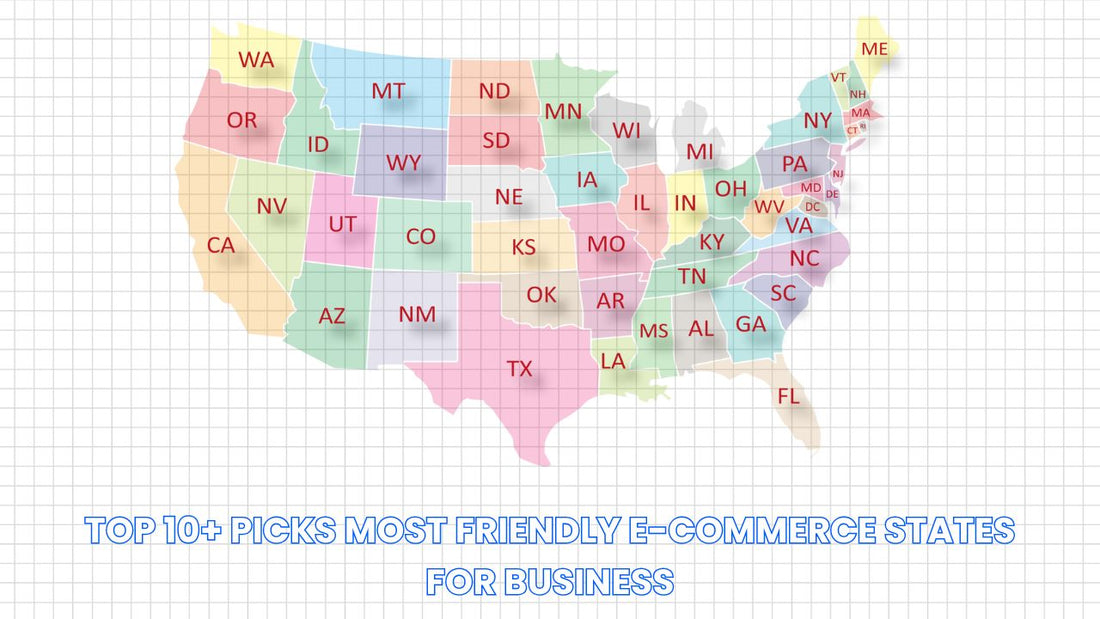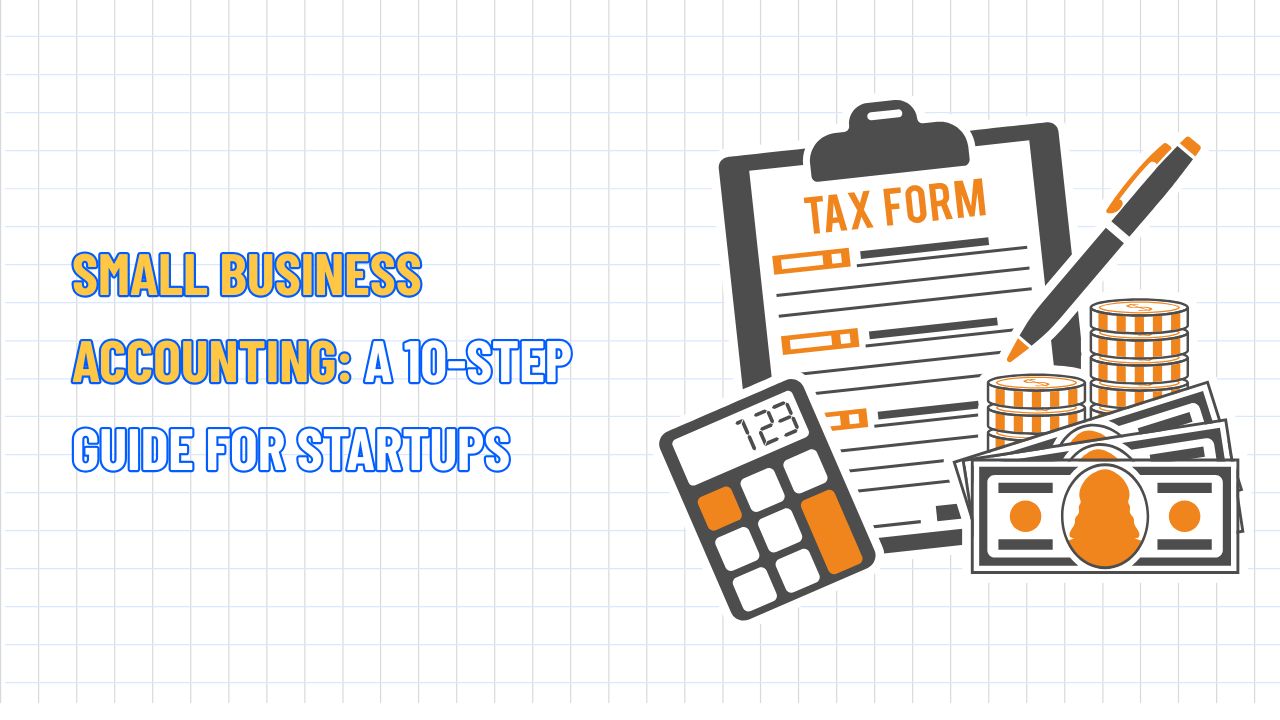10+ Most Friendly Business States That Merchants Shouldn't Miss
Table of Contents Hide
Starting an e-commerce business requires a creative idea and a solid strategic plan. One of the most critical decisions is choosing the right state to lay the foundation for your business. In this article, NextSky will guide you through the top states in the U.S. that are the most business friendly states, helping you launch smoothly and scale effectively.
Top 10 most business friendly states you shouldn't
Based on a detailed analysis of tax policies, infrastructure, workforce education, and regulatory environments, here are the top 10 most business friendly states in 2025.
1. Texas
Texas is a powerhouse for e-commerce due to its low-tax environment and superior logistics infrastructure. Thriving tech hubs like Austin make recruiting talent for website development, SEO, and customer support easy. The absence of a corporate income tax allows e-commerce businesses to reinvest profits into growth, while its proximity to major markets ensures efficient shipping.

Business stats:
- Corporate tax: 0.375% gross receipts tax (no corporate income tax)
- Sales tax: 6.25% (plus up to 2% local tax)
- Filing fees: $300 for LLC formation
- Small business stats: 3.3 million small businesses (99.8% of total companies in Texas)
- Unemployment rate: 4.1% (estimated 2025)
Key advantages for e-commerce:
- No personal income tax reduces costs for founders and employees.
- Major logistics hubs in Dallas, Houston, and Austin, with access to international airports and shipping ports, streamline order fulfillment.
- Fast-growing tech ecosystem in Austin, with access to skilled developers and digital marketing experts.
- Texas Enterprise Fund offers grants for job creation, benefiting e-commerce businesses scaling operations.
- A robust customer base with a population exceeding 30 million is ideal for direct-to-consumer brands.
2. Florida
Florida’s most business friendly states environment and warm climate make it a top choice for e-commerce entrepreneurs. However, rising insurance costs due to hurricanes can be challenging, so businesses should prioritize strong risk management strategies. Its proximity to international markets makes Florida especially attractive for e-commerce companies targeting global customers.
Business stats:
- Corporate tax: 5.5%
- Sales tax: 6% (plus local taxes)
- Filing fees: $150 for LLC formation
- Small business stats: 3.3 million small businesses (99.8% of total companies in Florida)
- Unemployment rate: 3.5% (estimated 2025)
Key advantages for e-commerce:
- No personal income tax boosts profits for founders and employees.
- Large and growing customer market with a diverse population of 22 million, perfect for testing and scaling e-commerce.
- Port of Miami and other logistics hubs support fast shipping to Latin America and beyond.
- Tax exemptions and workforce training grants through programs like Florida’s Enterprise Zone.
- Vibrant startup ecosystem in Miami, Tampa, and Orlando, with access to incubators.
3. Nevada
Nevada is emerging as an ideal destination for startups due to its lack of income taxes and minimal regulations, maximizing profits. Its strategic location near major West Coast markets enables fast and efficient shipping, while its most friendly business states environment supports sustainable growth.

Business stats:
- Corporate tax: 0% (1.17% modified business tax for businesses with payroll over $1 million)
- Sales tax: 6.85%
- Filing fees: $150–$200 annually
- Small business stats: 333,471 small businesses (99.3% of total companies in Nevada)
- Unemployment rate: 4.2% (estimated 2025)
Key advantages for e-commerce:
- No state income tax maximizes profits for e-commerce startups.
- Strategic location near California provides access to large markets without California’s high taxes and strict regulations.
- Low regulatory burden simplifies online business setup and compliance.
- Growing tech and logistics sectors in Reno and Las Vegas.
4. Utah
Utah is a goldmine for e-commerce businesses due to its tech-friendly environment and attractive tax rates. The state boasts a strong venture capital community, fostering the growth of online startups, including several “unicorn” companies valued over $1 billion. Salt Lake City, a central tech hub, is ideal for finding skilled programmers and experienced marketers.

Business stats:
- Corporate tax: 4.55%
- Sales tax: 4.85%
- Filing fees: $59 for LLC formation
- Small business stats: 352,191 small businesses (99.4% of total companies in Utah)
- Unemployment rate: 3.5% (estimated 2025)
Key advantages for e-commerce:
- A strong venture capital community supports e-commerce startups seeking funding.
- A highly skilled tech and digital marketing workforce is in Salt Lake City.
- Low taxes and filing fees reduce startup costs.
- Advanced tech infrastructure ensures fast, reliable internet for online operations.
- Utah Technology Council provides networking and mentorship opportunities for e-commerce entrepreneurs.
5. North Carolina
North Carolina is an ideal destination for e-commerce thanks to its attractive tax policies and skilled workforce. The Research Triangle, a hub for tech innovation, attracts top developers, data experts, and digital marketers, helping businesses thrive in the online marketplace.
Business stats:
- Corporate tax: 2.5%
- Sales tax: 4.75%
- Filing fees: $200 annual LLC fee
- Small business stats: 1.1 million small businesses (99.6% of total companies in North Carolina)
- Unemployment rate: 3.8% (estimated 2025)
Key advantages for e-commerce:
- Low corporate tax rate (2.5%), among the lowest in the U.S.
- Research Triangle (Raleigh-Durham-Chapel Hill) offers access to top tech talent and innovation hubs.
- Tax credits and startup support through the Research Triangle Regional Partnership.
- Robust logistics infrastructure supports e-commerce order fulfillment.
- A growing population provides a strong customer base for e-commerce brands.
6. South Dakota
South Dakota’s no-tax environment and low regulatory burden make it an appealing choice for e-commerce entrepreneurs looking to keep costs down. While its smaller population may limit local markets, the state’s simplicity and affordability are ideal for lean startups.

Business stats:
- Corporate tax: 0%
- Sales tax: 4.2%
- Filing fees: $50 annual LLC fee
- Small business stats: 94,379 small businesses (98.9% of total companies in South Dakota)
- Unemployment rate: 2.8% (estimated 2025)
Key advantages for e-commerce:
- No corporate or personal income tax maximizes profits.
- Low cost of living reduces operational expenses for e-commerce startups.
- Minimal regulations simplify compliance for online businesses.
- Strong community support for small businesses, including e-commerce.
- Affordable logistics and warehousing options in Sioux Falls.
7. Indiana
With its central location and low operating costs, Indiana is an ideal destination for most business friendly states aiming to optimize logistics efficiently and affordably. Known for its strengths in manufacturing and logistics, the state offers fast shipping, cost-effective operations, and flexible access to key markets.

Business stats:
- Corporate tax: 4.9%
- Sales tax: 7%
- Filing fees: $32 online, $50 by mail (biennial)
- Small business stats: 569,851 small businesses (99.4% of total companies in Indiana)
- Unemployment rate: 4.0% (estimated 2025)
Key advantages for e-commerce:
- Low corporate taxes and affordable filing fees reduce startup costs.
- Central location with extensive logistics infrastructure (highways, railroads, ports) supports e-commerce fulfillment.
- Workforce development programs provide access to skilled e-commerce talent.
- Low cost of living helps attract and retain employees.
- Tax credits and grants for small businesses, including e-commerce startups.
8. Tennessee
Tennessee’s logistics infrastructure and business-friendly policies make it a strong choice for e-commerce companies. Nashville’s tech ecosystem offers high-quality talent and networking opportunities, enabling online businesses to scale and break through.
Business stats:
- Corporate tax: 6.5%
- Sales tax: 7%
- Filing fees: $100 annual LLC fee
- Small business stats: 688,000 small businesses (99.5% of total companies in Tennessee)
- Unemployment rate: 3.7% (estimated 2025)
Key advantages for e-commerce:
- Low cost of living and competitive tax incentives attract e-commerce startups.
- Major logistics hubs in Nashville and Memphis ensure efficient shipping.
- Access to skilled tech and logistics workers through Tennessee’s workforce programs.
- The e-commerce ecosystem in Nashville is growing, with incubators and networking events.
- Strategic location with access to over 100 million customers within a one-day drive.
9. Georgia
Georgia’s blend of affordability, infrastructure, and talent makes it a most business friendly states. Atlanta’s tech ecosystem particularly appeals to startups using Shopify or custom platforms.

Business stats:
- Corporate tax: 5.75%
- Sales tax: 4% (plus local taxes)
- Filing fees: $100 for LLC formation
- Small business stats: 1.2 million small businesses (99.6% of total companies in Georgia)
- Unemployment rate: 3.9% (estimated 2025)
Key advantages for e-commerce:
- Low taxes and cost of living reduce operational expenses.
- Atlanta’s tech and logistics hubs support e-commerce growth.
- Access to a diverse, skilled workforce through Georgia’s universities and tech programs.
- Tax credits and incentives for e-commerce startups via the Georgia Department of Economic Development.
- Proximity to major markets enhances shipping efficiency.
10. Colorado
Colorado’s thriving tech ecosystem and high quality of life make it an attractive destination for e-commerce entrepreneurs. Denver’s dynamic startup scene helps founders expand networks, secure funding, and seize growth opportunities.

Business stats:
- Corporate tax: 4.55%
- Sales tax: 2.9% (plus local taxes)
- Filing fees: $50 for LLC formation
- Small business stats: 680,000 small businesses (99.5% of total companies in Colorado)
- Unemployment rate: 3.6% (estimated 2025)
Key advantages for e-commerce:
- Tech-savvy workforce in Denver, Boulder, and Colorado Springs supports e-commerce innovation.
- Low corporate taxes and startup-friendly policies reduce costs.
- High quality of life attracts top talent for e-commerce roles.
- Robust broadband infrastructure ensures reliable online operations.
- Access to venture capital and startup incubators for e-commerce growth.
Read more: How to Start a Business in 14 Simple Steps to Success
What makes a state business-friendly?
Several key factors shape a state’s appeal for starting and growing a business in the U.S. Here are the core elements that make certain states top choices for entrepreneurs:
- Taxes: States like South Dakota and Texas, with no corporate income tax, allow businesses to retain more profits for reinvestment.
- Labor laws: States like Louisiana and New Mexico offer low labor costs, reducing operational expenses.
- Infrastructure: Robust transportation, logistics, and high-speed internet create a foundation for seamless shipping and stable online operations.
- Workforce: States with strong education systems and vocational training provide a diverse, skilled labor pool.
- Formation process: Colorado and North Carolina offer fast registration and low fees, simplifying the startup process.
- Business costs: Low-cost states like North Dakota and Delaware provide more affordable operating environments than high-cost California.
Read more:
Top 10 Best Countries to Start a Business for Beginners
How Much Does It Cost to Start a Business? Budgeting Tips
Choosing the most business friendly states in the U.S. is critical to the success of your e-commerce venture. We hope this guide from NextSky helps you leverage supportive policies and resources to build a strong foundation for your business’s growth.










